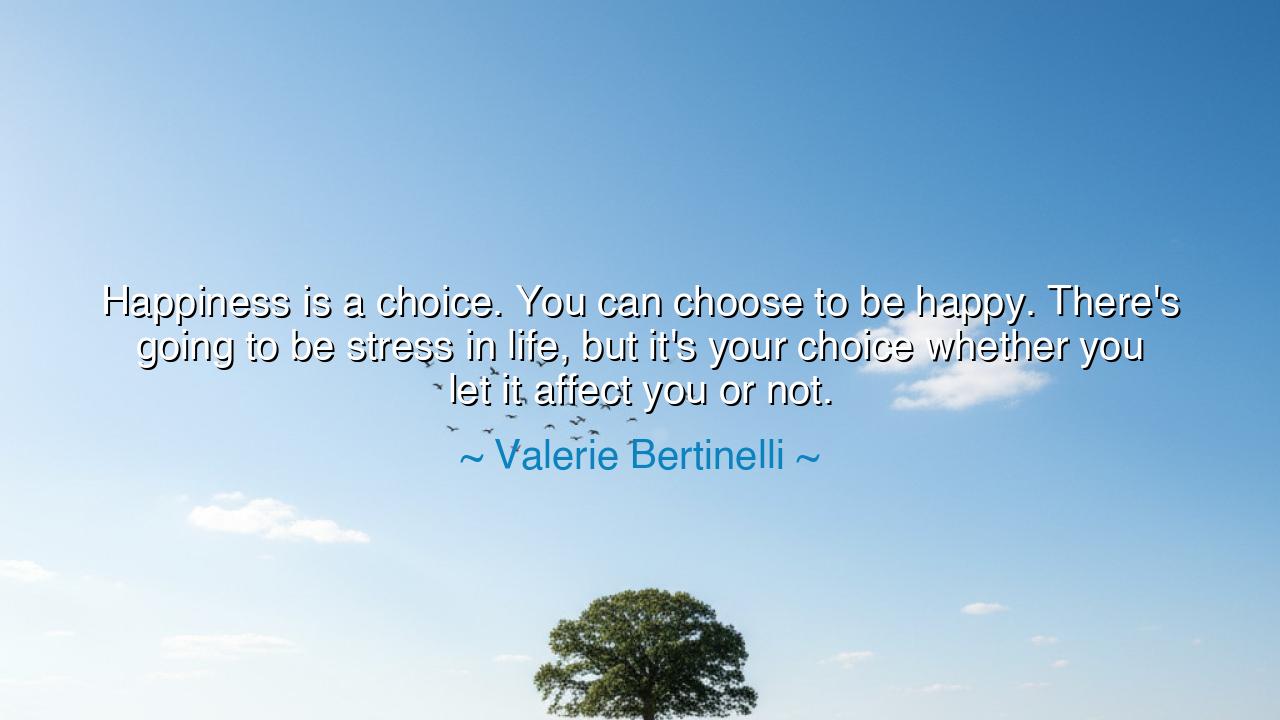
Happiness is a choice. You can choose to be happy. There's going
Happiness is a choice. You can choose to be happy. There's going to be stress in life, but it's your choice whether you let it affect you or not.






“Happiness is a choice. You can choose to be happy. There’s going to be stress in life, but it’s your choice whether you let it affect you or not.” Thus spoke Valerie Bertinelli, the actress and author whose life, though touched by fame, was also marked by loss, self-doubt, and renewal. In these words, she captures a truth known to philosophers, saints, and poets across the ages—that happiness is not bestowed by fate nor found in circumstance, but born from within the mind and heart. Her statement is not one of denial, but of empowerment: though the world may bring sorrow, we alone decide whether to dwell in despair or rise toward joy.
The origin of this quote lies in Bertinelli’s own life, a journey through both light and shadow. She faced the relentless pressures of public scrutiny, the pain of divorce, the grief of loss, and the quiet war of self-image. Yet through it all, she discovered that peace does not come when the storm ends—it comes when one learns to stand calm within it. By saying, “Happiness is a choice,” she does not suggest that life is easy, but that life’s difficulty cannot strip away the power of one’s own decision. She calls upon each soul to realize that while pain is inevitable, suffering—the dwelling in pain—is often a matter of consent.
The ancients, too, spoke this wisdom long before her time. Epictetus, the Stoic philosopher, said, “It is not things themselves that disturb men, but their opinions about things.” Like Bertinelli, he taught that the human mind is the final fortress of freedom. When we allow stress, misfortune, or insult to dictate our peace, we hand over the key to our own soul. But when we stand firm, saying, “I will not let this govern me,” then no external storm can touch the stillness within. In this sense, happiness is not a gift of the gods, but an act of will—a conscious alignment of the heart with gratitude, perspective, and acceptance.
Consider the story of Viktor Frankl, the psychologist who endured the horrors of Nazi concentration camps. Stripped of everything—family, freedom, even dignity—he discovered one truth that could not be taken: the power to choose his own attitude. In his book Man’s Search for Meaning, he wrote, “Everything can be taken from a man but one thing: the last of human freedoms—to choose one’s attitude in any given set of circumstances.” Frankl lived Bertinelli’s words in their most extreme form. Even in the midst of unimaginable suffering, he found meaning and even moments of peace. His choice was not to be free of pain, but to refuse to let pain define his spirit.
Bertinelli’s quote speaks also to the daily battles we all face—the small grievances, the mounting pressures, the fears that gnaw quietly at the heart. Stress will come; it is as natural as rain and as constant as time. But stress, she reminds us, is not the enemy—it is our reaction to it that matters. Like fire, it can destroy or illuminate depending on how we contain it. Those who choose happiness do not escape hardship; they simply refuse to give hardship their throne. They meet frustration with patience, failure with courage, and sorrow with faith.
The lesson, then, is this: happiness must be cultivated, like a garden in the soul. You cannot wait for perfect weather, for such weather never comes. You must plant seeds even in the storm—seeds of gratitude, forgiveness, and perspective. Each day, when anger rises or anxiety grips you, remember that you have a choice. You may feed the darkness, or you may turn toward light. The world will not make this choice for you; it is yours alone, and therein lies both your burden and your freedom.
To live by this wisdom, practice the art of mindful choosing. When stress comes, pause and ask: “Will I let this steal my peace?” When disappointment strikes, ask: “What can I learn instead of what can I lose?” When joy visits, even briefly, hold it close, for happiness is not the absence of hardship but the presence of gratitude amidst it. Train your mind daily as a warrior trains his body—discipline your thoughts, master your emotions, and let your spirit lead the way.
So remember, as Valerie Bertinelli teaches: happiness is not found—it is made. You are the artist, the sculptor of your own serenity. Life will offer storms, losses, and doubts, but none of these have the power to command your soul unless you grant them entry. Choose instead the courage to smile through the trial, to see hope where others see despair, and to rise each morning not asking for easier days, but for a stronger heart. For the one who chooses happiness each day, despite the noise of the world, has already won the greatest battle a human being can fight—the conquest of the self.






AAdministratorAdministrator
Welcome, honored guests. Please leave a comment, we will respond soon